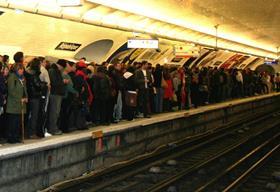
In France, there is no shortage of advertisements alluding to the forthcoming European Football Championships, which take place next week throughout the country. Yet, the news is currently packed with stories that make the smooth running of a football tournament hard to imagine.
New controversial labour reforms that make it easier for businesses to hire and fire staff were pushed through the lower house of parliament without a vote, leading to widespread strikes.
As a result, fuel supplies are currently running low, nuclear power stations have been closed and national newspapers have remained unprinted.
A national railway strike looks likely to begin tomorrow (Wednesday), according to state rail company SNCF, while the Paris Metro is expected to see strikes start on Thursday.
Pilots for Air France have also voted to take strike action some time in June for at least six days. Meanwhile, six of France’s eight oil refineries have halted operations or are running at reduced capacity due to union action.
Rungis-based importer Commercial Fruits has experienced a major slowdown towards the end of May as a result of the strikes.
“For the time being, we haven’t missed any deliveries,” said the company’s president, Gabriel Burunat. “But if the strikes continue or get worse, then that could happen. The current climate is not favourable to business, what with the strikes, the blocking of oil refineries and student protests, which all has an impact on commercial transactions. Visits to the shops have dropped in frequency, while most people are avoiding travelling anywhere that requires a car in order to save petrol.”
With the Euros just around the corner, French workers clearly spy some leverage. However, French president François Hollande has so far shown no sign of backing down from the reforms.



